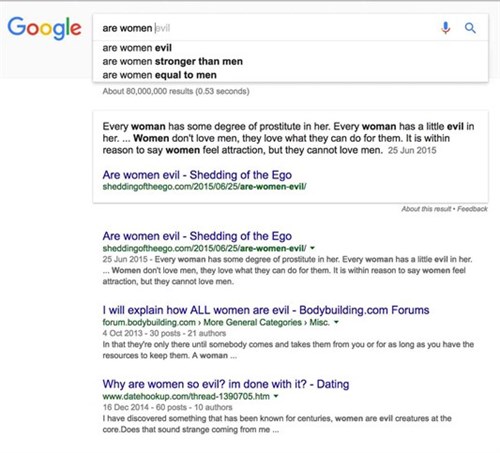The past few months have seen a good deal of negative press thrown towards Facebook. To begin with, its decision to dissolve its team of 'human editors' that controlled the Trending widget in favour of an automated algorithm drew some ire, and now this has only been exacerbated by allegations of 'fake news' over the course of the US presidential election.
More recently, an Observer journalist noticed that Google's autocomplete suggestions for 'are Muslims' 'are Jews' and 'are women' returned the disconcerting suffixes 'evil' or 'bad' as the top suggestion. In one instance, Google's Instant Answers box pulled in a particularly concerning answer:

Google, as expected, has taken immediate steps to rectify the situation, but this got us thinking about how content marketing could become a tactic for websites dealing with fringe opinions to gain more traffic, much in the same way the US alt-right may have profited from Facebook's algorithm to spread its agenda.
The Instant Answer boxes convey a certain legitimacy, which many sites will exploit to achieve a de facto first position in a competitive SERP by optimising for Instant Answers. The example above isn't particularly well written, bears no empirically verifiable information and is dated. It's worth pointing out at this stage that this is a very irregular SERP example, and could well have been influenced by the author's search history.
Nevertheless, this calls to mind the era of black-hat SEO, which has for the most part ceased to exist as a mainstream SEO tactic following Google's punishing algorithm updates and promotion of usability as a key ranking factor. Back then, with enough backlinks and keywords you could rank for pretty much anything, if only for a short time. Based on this example, it's not a stretch to imagine that if your website has a sound technical footing and you can produce decent copy, you should be able to rank for terms like this, or perhaps for more longer-tail ones (are women the spawn of the devil, for example).
While at Greenlight we'll typically treat Google and Facebook as customer acquisition channels, events over the last few months have cast a light on an entirely different optimisation battleground; one where promoting information and an agenda rather than dropping customers into a conversion funnel is the objective.
Is this the start of SEO for ideologies? Will Google continue to strive to present an accurate representation of what content is out there, or will it develop filters to prevent ideologies which jar with our 21st century liberal sensibilities from appealing in the SERPs? Where would the demarcation sit between offensive ideology (e.g. Islamophobia, Sexism) and acceptable ideology (e.g. mainstream religion, liberal values)? Only time will tell, though it's worth keeping an eye on your newsfeeds and SERPs over the coming months to see how things might fluctuate.

